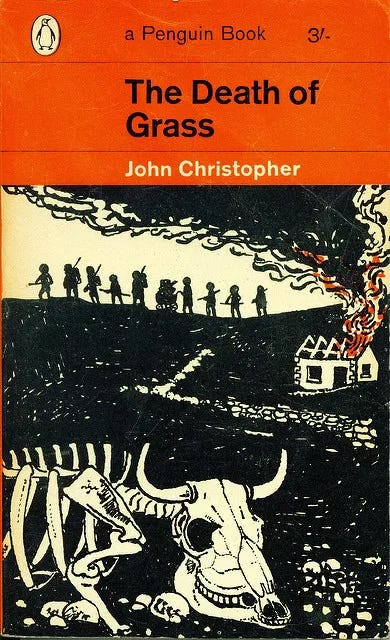The Substack app has become my favourite reading app. The notes timeline, their take on Twitter, is a waterfall of content from delightful word nerds all over the world. The original platform, the posts/newsletters, has become such a popular bolt-hole for writers fleeing the collapsing corporate media that I feel confident in getting most of my subject matter expert content from there.
It has stuff like this, a crunchy long-form piece on Operation Downfall, the planned invasion of Japan, written by Wes O’Donnell, a “Multi-Branch Veteran and Military & Global Security Writer”. For alt hist fans its a goldmine.
And stuff like ‘Famished Barbarians’, a deep dive into a very old, very English end of the world novel The Death of Grass, in which civilisational collapse is effected by a disease that kills off, er, all the grass all over the world. I’d never even heard of it, and this very, very late review, about 70 or 80 years post-publication, isn’t going to have me rushing out to find a copy. It sounds fucking grim. But the review essay was great, and raised this really interesting question - when is it appropriate to go full barb’…
When thinking about apocalypse in the abstract, it’s a dilemma of sorts: if you accept that social disintegration requires adopting a new moral code, at what point, or after what events, do you adopt that code? It is a question I’ve enjoyed posing to students. Only one or two have ever answered “never”: they maintain that they would prefer to maintain their moral code rather than survive, if it came to that. Most suggest an interval of time on the order of weeks. When I ask them why, it is because they are expressing an uncertainty about whether or not the social disintegration has actually occurred. They wouldn’t want, as happens in the South Park episode, to be found chewing on a human femur when the snow plow shows up. The tricky balance is acknowledging that the more time goes on, the fewer resources or opportunities they may have under the “new moral order” (e.g., to steal or loot), but that without adding some kind of time interval, they fear crossing into morally deficit territory prematurely.
There’s spoilers galore, but as I said I’m not going to be adding it to my stack of shame anytime soon. I just really, really enjoyed the review essay.
And it did give me plenty to think about, which is something I wouldn’t expect from a decades-old apocalypse novel.





"They wouldn’t want, as happens in the South Park episode, to be found chewing on a human femur when the snow plow shows up."
This immediately brought to mind the ending of the movie of The Fog, a Stephen King novella adaption.
I would imagine that the adoption of a new moral code is dependent on when survivors accept that there's no going back to "the way things were", and their acceptance of their new reality.
I find the question around accepting a new morality interesting, as if humanity are not constantly reviewing and updating our morals as society evolves. We openly mock Victorian style pearl clutching around modesty now, with the caveat that we no longer live in that world. Accepting a new morality post apocalypse is perfectly rational once you realise the world you used to live in no longer exists.
Decades-old apocalypse novels are completely legit. Of course, you have to overlook the sheer antiquity of the prose, but it's the bones that matter.